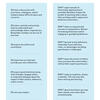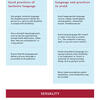The Barnett College of Public Health’s diversity committee works to support policies and procedures that promote diversity, equity and inclusion.
We embrace the differences, values and unique qualities of every individual. We are committed to building a diverse educational community founded on respect, open-mindedness and appreciation of others. We understand that diversity is expressed in myriad forms, including—but not limited to—race and ethnicity, gender identity, sexual orientation, socioeconomic status, language, culture, national origin, religious commitments, age, disability status and political perspectives.
Our policies, practices and programs treat everyone equally, respectfully and impartially. They exemplify our commitment to civility, non-discrimination and pluralism, encouraging dialogue that builds meaningful and collaborative relationships throughout our academic, service and research programs.
We promote a safe, welcoming and inclusive environment in which to work, learn and grow. We are committed to pursuing deliberate efforts to make our college a place where differences are welcomed and celebrated.
Our diverse learning environment
As a student in the Barnett College of Public Health, you will explore diversity, cultural competence and health disparities within your coursework, and you will have the added benefit of learning and living with students, faculty and staff who are similar yet different from you, thanks to the diversity that exists within our college. Temple University and the Barnett College of Public Health are known for the diversity within our student body.
Studying in our diverse environment will allow you to explore your own values and how they influence your thoughts and behaviors. It will also prepare you to more effectively work in the health and human services fields, because you will value the uniqueness of each client and group that you serve.
Embrace this unique aspect of your Temple education by participating in one of the many service learning opportunities sponsored by the Office for Clinical Practice and Field Education.
Resources for students
Temple University’s Office of Institutional Diversity, Equity, Advocacy and Leadership (IDEAL) embodies the university's commitment to sustaining and nurturing an inclusive campus community—offering a plethora of student opportunities, resources, education, programs and more.
Explore some of the resources available to students:
- There are more than 300 registered student organizations at Temple, many of which focus on cultural identities.
- Diversity Peers, IDEAL's volunteer student leadership group, advocates for and organizes diverse cultural programming across campus.
- The university offers programming and resources for and in partnership with the LGBTQIA+ community, including the opportunity to earn a Safe Zone Certification.
- Owl Talk Dialogues are designed to facilitate meaningful conversations between students about diversity and social justice.
Resources for faculty and staff
Nearly 400 faculty and staff members from diverse backgrounds work at the Barnett College of Public Health. College employees are committed to creating a welcoming and inclusive environment for all.
Explore some of the resources available to faculty and staff:
- The university's Office of Institutional Diversity, Equity, Advocacy and Leadership (IDEAL) offers training and educational opportunities on diversity and inclusion.
- IDEAL staff are available to deliver various presentations and workshops to classes or departments on topics ranging from bias to social justice and beyond. Custom-designed workshops are also available upon request.
- The Temple Women of Color group seeks to enrich an understanding of diversity through shared experiences as women and is open to all individuals who share its mission.
- Temple's Office of Equal Opportunity Compliance implements the university's institution-wide efforts for equal opportunity, equal access and affirmative action.
Shared language and inter-cultural understanding guide
The Barnett College of Public Health has developed a resource guide to prioritize the use of inclusive language strategies to standardize communication efforts and avoid language-based subgrouping within the Temple community. Two charts from this guide focusing on the use of inclusive language and the 'dos and don'ts' of engaging in difficult conversation are below. Explore the full guide.



